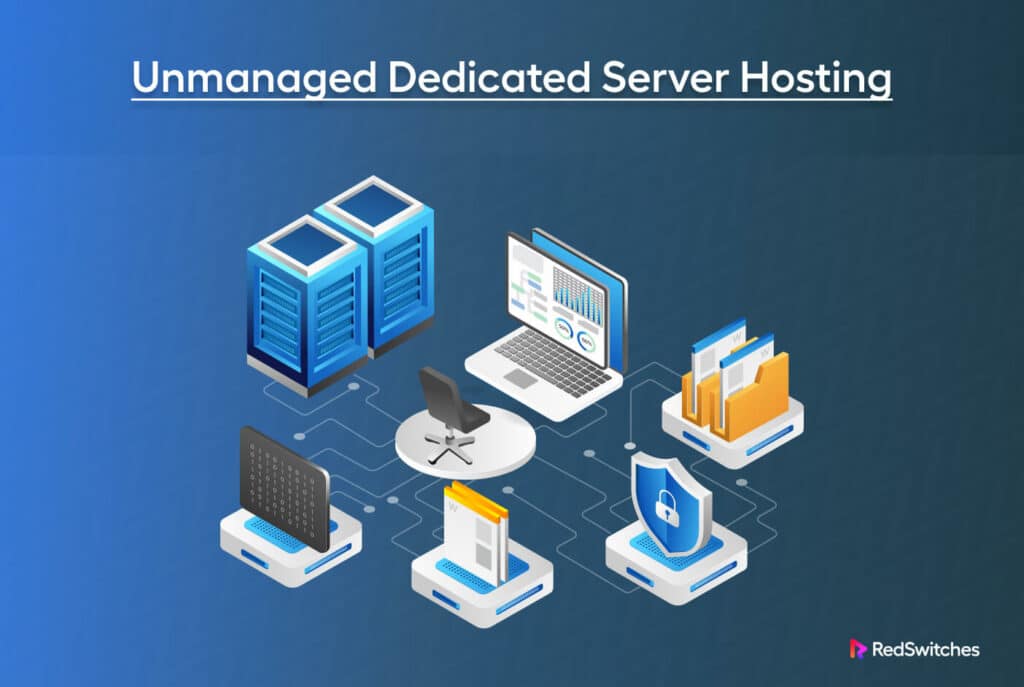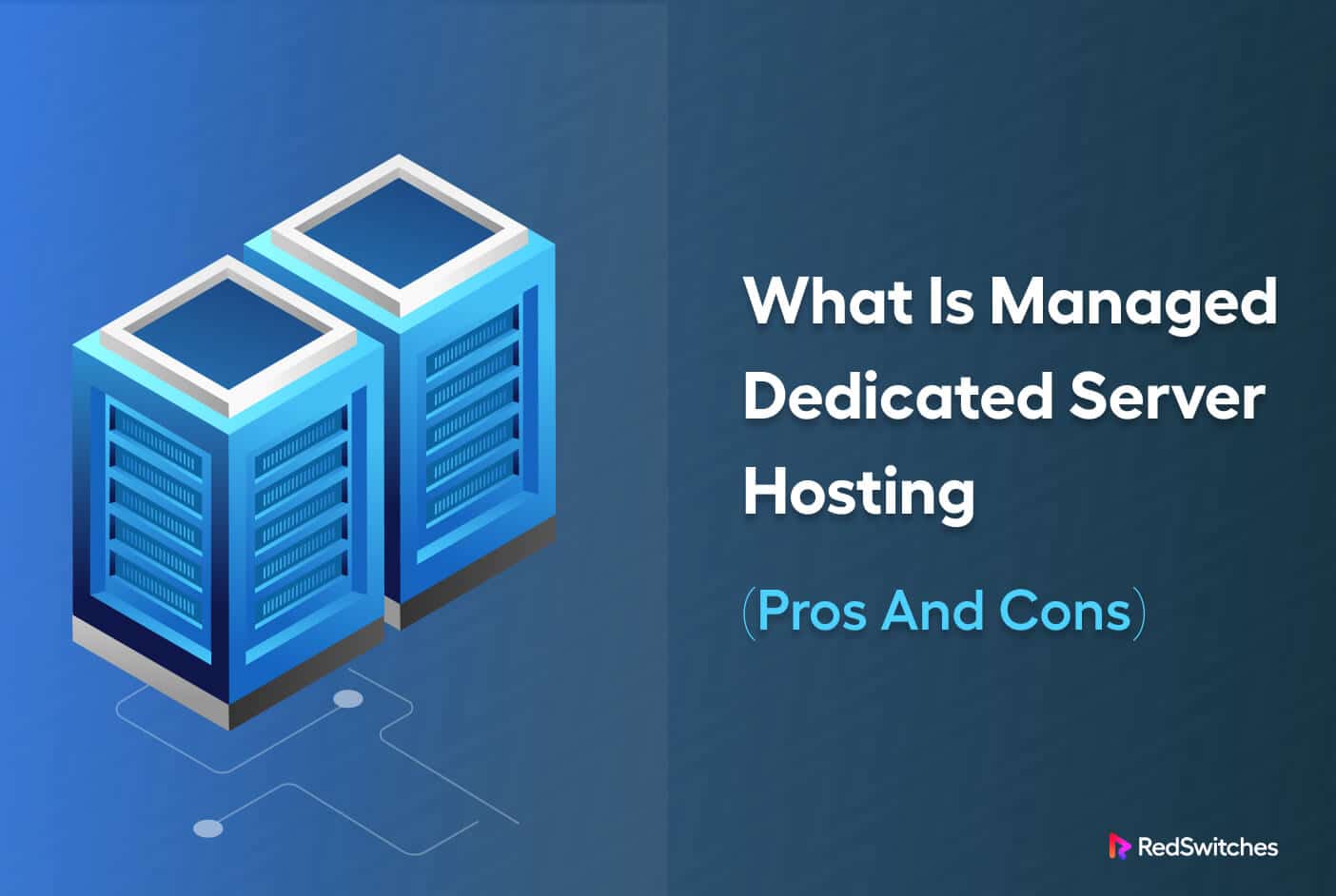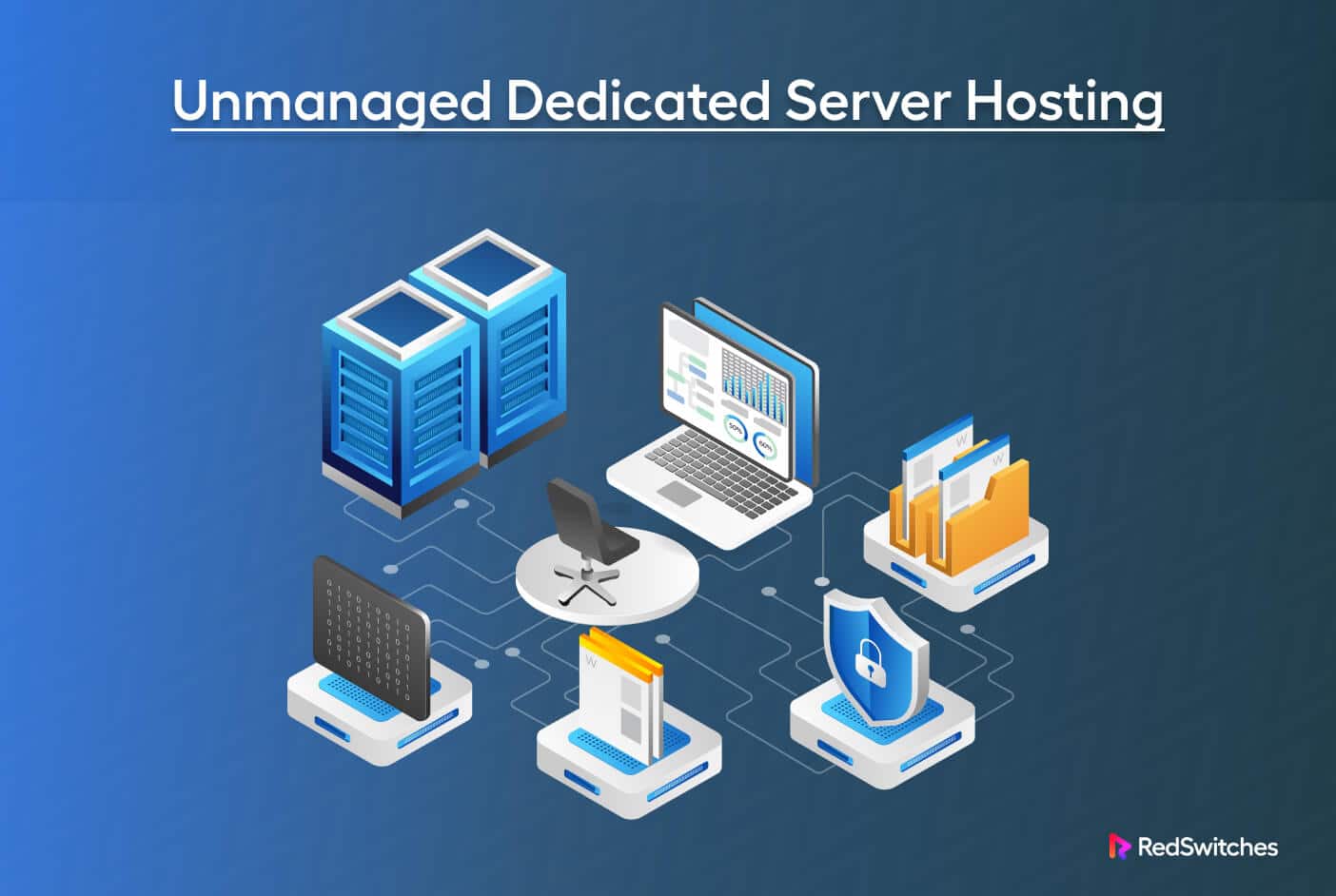When it comes to web hosting, dedicated server hosting is often considered the gold standard for high-performance websites and applications. Dedicated servers offer complete control over the server environment, including customizing hardware and software configurations to meet specific needs.
However, when choosing a dedicated server hosting provider, one of the most crucial decisions is to opt for managed or unmanaged hosting.
In this article, we’ll explore the idea of dedicated servers, unmanaged or managed, so that you can make an informed business decision about using dedicated servers for your business operations.
Table Of Contents
- Managed vs Unmanaged Dedicated Server Hosting
- Managed Dedicated Server Hosting
- Unmanaged dedicated Hosting
- Major Differences Between Unmanaged and Managed Dedicated Servers
- Choosing Between Managed and Unmanaged Dedicated Servers
- The Importance of Support
- Tools For Managing Unmanaged Servers
- Conclusion
Managed vs Unmanaged Dedicated Server Hosting
Managed and unmanaged dedicated server hosting are two options for hosting websites and applications on a dedicated server.
Let’s start with a brief introduction of these two configurations of dedicated servers and then discuss the benefits and drawbacks of the options.
Managed Dedicated Server Hosting
In this type of hosting, the hosting provider looks after all server management tasks, including server setup, maintenance, security, and updates.
They also provide technical support and assistance with software installation and configuration. Managed dedicated hosting is usually more expensive than unmanaged hosting. Still, it offers peace of mind and convenience for those who don’t have the expertise or resources to manage a server themselves.
Benefits
Managed dedicated servers offer a range of benefits, including:
Hassle-free Server Management
With managed hosting, the hosting provider handles server management on behalf of their customers. Usually, server management includes provisioning new servers, software updates, security (installation of security components and application of patches), backups, and troubleshooting issues as they arise. For customers, this frees up time and resources that can be diverted to other critical business operations.
Expert Technical Support
Managed hosting providers typically offer expert technical support to help customers deal with server-related issues or concerns. However, you should note that different vendors have different scope for support. As such, you should ask a hosting provider about their support provisions to compare options.
Higher Reliability
Managed hosting providers usually offer high-performance hardware, redundant network connections, and other features to ensure the server uptime and reliability they’ve promised to deliver.
Drawbacks
Despite their benefits, managed dedicated servers aren’t for every user. If you’re considering a managed dedicated server for your project, you should consider the following factors before you make the decision.
Higher Costs
Managed hosting is usually more expensive than unmanaged hosting due to the added service and support the hosting provider delivers. In the case of managed servers, this cost difference might be significant enough to affect the project budget.
Limited Flexibility
Hosting providers often have policies that govern server configuration, including the supported software components (such as supported programming languages and frameworks). Similarly, vendors have a comprehensive security process that ensures server stability and continued operations.
You should carefully consider these policies to discover potential conflicts with your requirements.
Potential Communication Issues
Working with a managed dedicated server requires much to and fro between the customer and the hosting vendor. Customers often find that maintaining communication can add overheads to their operations. If the customer and hosting provider have different expectations or goals for the server, communication issues or conflicts may lead to misunderstandings and delays.
Unmanaged dedicated servers Hosting
Unmanaged dedicated servers hosting is a type of hosting where the customer is responsible for managing the server and, often, the associated infrastructure. Here, the vendor provides the hardware and infrastructure, and the customer sets up the software environment, deploys their applications, and secures the operations.
Benefits
Unmanaged dedicated servers hosting is a type of hosting where the customer is responsible for managing the server and, often, the associated infrastructure. Here, the vendor provides the hardware and infrastructure, and the customer sets up the software environment, deploys their applications, and secures the operations.
Greater Control and Flexibility
With dedicated servers and unmanaged hosting, customers have complete control over server configuration, software installation, and customization, allowing for greater flexibility and customization. In fact, this is the number one reason why many big companies prefer dedicated servers in unmanaged settings to customize the server settings to fit their needs fully.
Lower Costs
Unmanaged dedicated servers hosting is usually less expensive than managed hosting, as the customer is responsible for all server management tasks. Note that while this reduces the costs of server rentals, the business might see an increase in the internal server management budget.
Better Team Skill Building Opportunities
Customers who choose unmanaged hosting have better-trained in-house technical expertise. Businesses can train teams on server maintenance and management by allowing them access to unmanaged servers.
Drawbacks
Dedicated servers in unmanaged environments can be a challenge for many businesses because of the following reasons:
Time-Consuming Server Management
Dedicated server unmanaged hosting requires the customer to handle all server management tasks, including updates, security, backups, and troubleshooting. All these tasks take significant time and resources. In addition, these tasks require a dedicated in-house team that adds to the challenge of working with these servers.
Limited Technical Support
Hosting providers typically offer limited technical support for unmanaged hosting, meaning the customer is responsible for resolving server-related issues or concerns. The hosting vendor is generally responsible for maintaining the hardware infrastructure for unmanaged dedicated servers.
Higher Risk
Dedicated server unmanaged hosting requires the customers to take full responsibility for server security and maintenance. This can lead to higher risks of downtime and security breaches if the business cannot manage the server properly.
Significant Differences Between Unmanaged and Managed Dedicated Servers
Here are the critical differences between unmanaged and managed dedicated servers:
Server Management
The primary difference between managed and unmanaged dedicated servers is server management.
The hosting provider handles all server management tasks with managed hosting, including server setup, maintenance, security, and updates. In contrast, the customer is responsible for all server management tasks with unmanaged dedicated servers.
Technical Support
Managed hosting providers typically offer expert technical support to help customers with server-related issues or concerns. In contrast, unmanaged hosting providers usually offer limited technical support (mostly related to server hardware maintenance), leaving the customer responsible for resolving server-related issues or concerns.
Cost
Managed hosting is usually more expensive than unmanaged hosting due to the added service and support the hosting provider provides. In contrast, unmanaged hosting is usually less expensive than managed hosting, as the customer is responsible for all server management tasks.
Flexibility and Customization
With dedicated servers and unmanaged hosting, customers have complete control over configuration, software installation, and customization. This flexibility and customization allow businesses to set up the server to cater to the unique requirements of their projects.
In contrast, with managed hosting, customers may have limited control over server configuration and software installation, as the hosting provider has internal policies and restrictions for security and stability reasons.
Expertise Requirements
Managed hosting is suitable for customers who don’t have the technical knowledge or resources to manage a server themselves. In contrast, unmanaged hosting is suitable for customers with technical expertise or access to technical resources, allowing them to optimize the server’s performance for their specific needs.
Choosing Between Managed and Unmanaged Dedicated Servers
Choosing between managed and unmanaged dedicated servers can be challenging for businesses and individuals looking to host their websites and applications. While both options have pros and cons, unmanaged dedicated servers are often better for businesses needing more control and flexibility over their server environment.
Unmanaged dedicated servers configuration provides users complete control over the server’s configuration, hardware, and software. Users can install any software, operating system, or application and configure the server to meet their needs. Additionally, unmanaged dedicated servers provide users with full root access, which allows them to perform advanced server management tasks, such as creating custom scripts, setting up firewalls, and optimizing server performance.
One of the primary benefits of unmanaged dedicated servers is their cost-effectiveness. Since users are responsible for managing the server, they don’t have to pay for additional management services, which can significantly reduce overall hosting costs. Additionally, users can choose the hardware and software configurations that best suit their needs and budget rather than being restricted to a preconfigured package offered by a managed hosting provider.
The Importance of Support
The support provided by a hosting provider can significantly impact the performance and success of a website or application running on a dedicated server.
Without exception, you need technical knowledge and expertise to manage dedicated servers. Equally important is the fact that the lack of support can result in downtime, security vulnerabilities, and other issues that can negatively impact business operations. Therefore, it is crucial to consider the level of support a hosting provider offers when selecting a dedicated server.
Pre-Sales Consultation
When selecting a dedicated server, it is essential to clearly understand the features and specifications required to meet the website or application’s needs. A hosting provider that offers pre-sales consultation sessions can help identify the correct server configuration and provide guidance on the setup and management of the server.
Issue Resolution Window & SLAs
Security and performance Issues can occur anytime and have significant consequences for business operations. A hosting provider offering quick and effective issue resolution can help minimize downtime and ensure the server operates optimally. Usually, these services are delivered under an SLA that includes terms like 24/7 support, proactive monitoring, and maintenance to identify and resolve issues before they become serious problems.
In terms of managed vs. unmanaged dedicated servers, managed servers typically include more comprehensive support, monitoring, maintenance, security updates, and issue resolution. On the other hand, unmanaged servers may require more technical expertise from the user to manage and maintain and may not include as much support from the hosting provider.
It is essential to carefully consider the level of support required when choosing between managed and unmanaged dedicated servers.
Tools For Managing Unmanaged Servers
Managing unmanaged dedicated servers can be challenging, especially if you don’t have the technical expertise or experience. However, several tools can help you manage your unmanaged server more efficiently.
Here are a few of those tools:
1. Control Panels
Control panels like cPanel, Plesk, and DirectAdmin provide a web-based interface to manage your server’s settings, applications, and configurations. These panels offer features like email management, file transfer, and database management, making it easier to manage your server without using the command line.
2. Server-Monitoring Tools
Monitoring tools like Nagios, Zabbix, and Munin can help you monitor your server’s health, performance, and uptime. These tools provide real-time alerts and notifications when they detect issues with your server. We highly recommend having an action plan for the most common server issue so that you can immediately rectify the issue as soon as these tools report in.
3. Security Tools
Security is a critical aspect of server management. Tools like Fail2ban, CSF, and ModSecurity can help you secure your server by blocking IP addresses, detecting and preventing brute-force attacks, and filtering malicious traffic.
We highly recommend you have dedicated resources for server security so that your critical operations and data are always protected. This might inflate your server operations budget, but this investment will pay off in the longer run.
4. Backup Tools
Backing up your server’s data is crucial to ensure you can recover with minimum downtime in data loss or corruption cases. Tools like Rsync, Bacula, and Duplicity can help you automate the backup process and confirm that your data is entirely safe and recoverable. In most cases, businesses set up a 3 2 1 backup process that results in a proactive recovery from an archive.
5. Command-Line Utilities
While graphical tools like control panels can be helpful, you may need to use the command line to manage your server more efficiently. Some useful command-line utilities include SSH, SCP, SFTP, and screen.
Conclusion
Unmanaged dedicated servers are an excellent option for businesses and individuals looking for more control, flexibility, and cost-effectiveness over their server environment. With the right tools and knowledge, unmanaged dedicated servers can provide users with unmatched flexibility and scalability for their hosting needs. However, it’s essential to consider your technical expertise and security requirements before opting for unmanaged hosting.
If you’re looking for an ideal dedicated server hosting provider to help you through the process, contact RedSwitches today. We offer premium bare metal and Unmanaged dedicated servers and managed for clients worldwide. With 20+ global locations and countless customization options, there’s no one better than us.
Contact us now to learn more.




